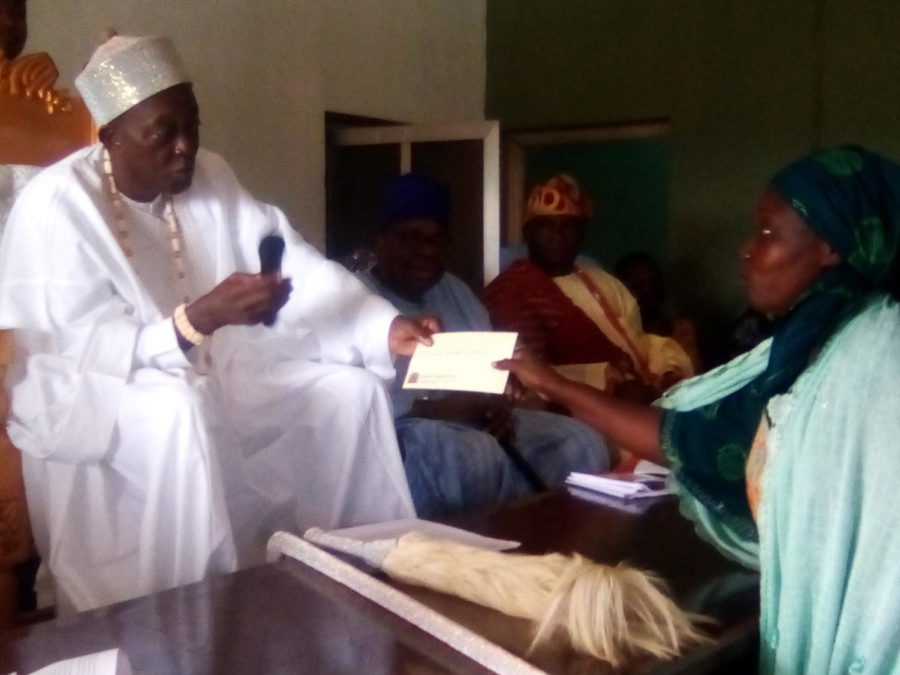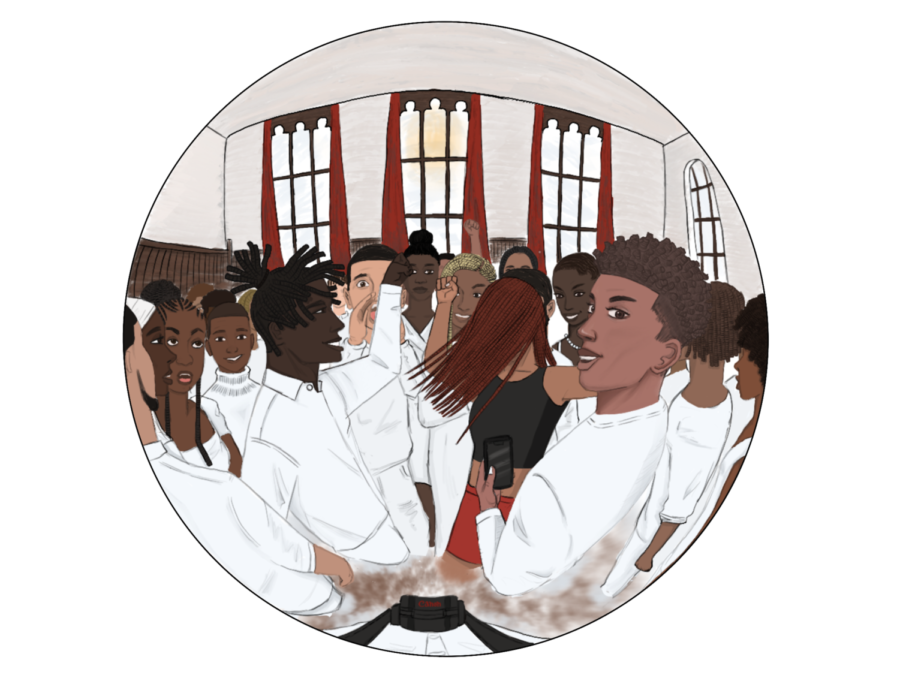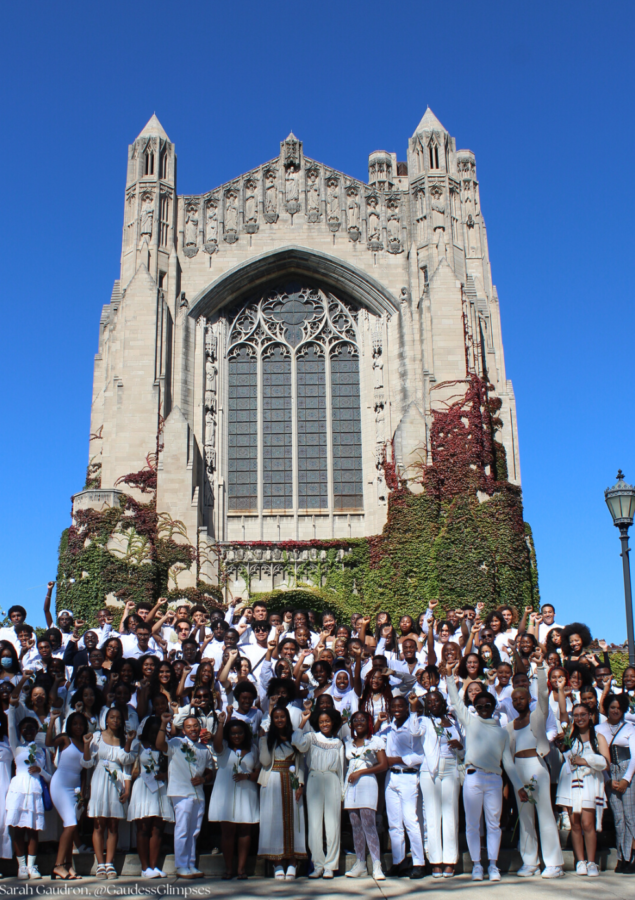A major part of Black History Month is celebrating the achievements of Africans and African people across the diaspora. And there’s a lot of Black excellence–which is the idea that Black people who have a high level of success, achievement, or talent should be highlighted for other members of the diaspora–to celebrate.
Yet, there is one aspect connected to Black excellence that is worth emphasizing. We call ourselves kings and queens, yet, for most of us, we do not have any clear-cut connection to any royal African roots. In fact, a joke heard time and time again is a Nigerian prince trying to contact someone, his long-lost family member, to share his wealth. But for me, being contacted by a Nigerian royal, an actual family member, is very real and something that has happened to me.
Now, granted, it wasn’t exactly like The Princess Diaries where I was immediately whisked away to my homeland in order to become an active member of a royal family. That being said, my dad did casually mention over Thanksgiving break two years ago that my uncle we’d be visiting later in Nigeria was a king (and actually had been a king for two years—thanks for sharing late, Dad!)
Once I heard this, I had so many questions. I wanted to know about him, my family, and the specific group of Yoruba people my dad’s family comes from, the Gbagura. When I got to Nigeria and met my uncle after not seeing him for some time, I asked him so many questions that he got one of his head chiefs to come and help him answer them.
Here is the story of my family, my people, my uncle the king, and why Black African royalty still matters in our celebration of Black History Month and today’s world.
In Nigeria, there are three main tribal groups: the Hausa in the north, the Igbo in the east, and the Yoruba, the one I’m a part of, in the southwest. Within each of these tribes, there are many, many subgroups, and each subgroup usually has its very own specific traditions, including how they traditionally choose their ruler. Because of this, there are a lot of tribal leaders/kings, called obas in Yoruba, around the country.
My uncle’s full name and title is Oba (Dr.) Saburee Babajide Bakre, Jamolu II, Agura of Gbagura. Specifically, he is the king of the Gbagura people, a subgroup of the Yoruba people, in Egbaland in Nigeria. He and I are related on my father’s maternal side of the family.
According to the history told by my uncle and his court, the Gbagura people migrated to the present-day area between Ibadan and Abeokuta, both major cities in Yoruba territory. In the early nineteenth century, the Gbagura people became a major force within the area and attempted to form a Egba Federation. They did this in order to obtain independence from the Ilaris, who were emissaries of the Olooyo, another tribal group.
The Gbagura overtook and fortified Abeokuta, solidifying their independence and remaining a powerful force in Nigerian politics. In fact, the first Agura of Gbagura, Oba Jamolu, ruled from 1870-1877 was from my uncle’s—and therefore my—family lineage.
Today, the Oba presides over a dominion of nineteen townships. “As the prescribed authority over Gbaguras, my primary responsibilities to my subjects are to ensure peaceful coexistence amongst the citizens and development of the various communities [and]…settlements of land disputes among the citizens as they arise,” Oba Bakre wrote.
Additionally, the Oba can give titles to “deserving” Gbagura people at home and abroad in the diaspora, making the concept of Black kings and queens, at least politically, a reality.
Since Gbagura functions much like other kingdoms, the Oba has the final say on any matter. Despite this, the Oba has a Complaints Committee that can adjudicate disputes that is made up of the Oba and five chiefs he has selected. He also meets monthly with the heads of each township to head the Gbagura Council of Baloguns and Chiefs to discuss matters of state.
Besides many political powers that make him stand out from the other chiefs, the Oba also wears different traditional dress than the other chiefs. An Oba always wears a crown, complete traditional dress, walking stick, horse tail, beads, and special shoes. Additionally, because he is forbidden to touch people outside his family, he holds a greeting stick to greet his subjects and others outside his domain.
However, one of the most fascinating parts of the Oba’s rule is how my uncle was chosen. There are only two ruling houses that can produce an heir to become the Agura of Gbagura. They are the Egiri Ruling House, made up of the Jamolu, Ijade, Abolade, and Adeosun families, and the Jiboso Ruling House, made up of the Olubunmi and Shobekun families. My uncle and I belong to the Egiri Ruling House, just like the first Agura of Gbagura.
Once the Agura Oba dies and a 90-day mourning period is observed, the Kingmakers of Iddo Traditional Council of Chiefs, made up of six Ogboni and six Ologuns (chiefs), allow applications to be taken for the position of the Oba. Qualifications are based on criteria coming from a candidate’s respective ruling house, educational qualifications, and work experiences. Then, after a round of interviews, seven out of the 16 candidates are requested to step out of the race, leaving only nine. The nine go through “additional screening”, and the final three are brought to the Ifa Oracle, who determines who will actually be Oba.
“Another phase in the Obaship process was the seclusion stage which lasted for ninety days in which I went through the rites of Obaship as Agura of Gbagura. My freedom of movement…[was] curtailed,” wrote Oba Bakre.
Before assuming the throne, the current Oba lived a fairly normal life. He was born in 1960 to Prince Rasaq Olayinka Bakre and Alhaja Latifatu Bakre Adeghite, both from Gbagura. He spent time in Ibadan, Abeokuta, and Isolo for school until 1981, and received a degree in Business Administration in 1986. He worked for the Nigerian Customs Services and became Chief Superintendent of Customs, leading him to work in various parts of Nigeria. Today, besides ruling, he spends time with his wife and family, along with devoutly practicing his Islamic faith.
This system is interesting because of how different it operates from the traditional, European monarchies Americans are used to hearing. In other words, obas, at least in Gbagura, aren’t raised as royalty and have a fairly normal life. This practice is something that ties into and reinforces the idea of Black royalty: Black Americans may not be born into as favorable of situations as other American citizens, but instead, find themselves taking initiative and seizing opportunities given to them to achieve the greatness connoted with Black royalty.
Despite this rich culture and system of governance, the world today is trending more and more towards democracy, putting less of an emphasis, politically and socially, on kings and queens of yesteryear. A notable example of this is the former Prime Minister of the United Kingdom, Liz Truss calling for the abolition of the British Monarchy when she was younger. Because of this, what does it mean not just to be a king in our modern world, but a Black king?
During British colonialism, much of the power local Obas had, including being selected by their own people, were transferred to the British colonial government and, subsequently, the Nigerian national government. For the Oba, he believes that it’s important for traditional institutions to play major roles in how Nigerian people are governed.
“Because of the closeness of the traditional institutions to its people it is germane to assign specific duties to them which should be spelt out in the Nigerian constitution. [D]uring the colonial period, Obas were appointed as President of the District Council in their area of locality,” wrote Oba Jamolu. “My people have a crucial role to play in the elections of who to govern them based on the principle of democracy.”
Though on a much larger scale, Oba Jamolu’s actions are similar to that of what we see in African-American culture of the idea of a Black king (similar to a Black queen); a Black man who possesses admirable qualities that makes him not only a great leader, but a person others in the Black community can look up to. In other words, it’s possible to suppose black royalty serves a much more socio-emotional component than its African counterpart. Royalty connotes a sense of leadership, success, and excellence, an idea that serves as a method for Black Americans to empower themselves.
With many tribal cultures during the slave trade being subsumed into more of a monolith, its both fascinating and a testament to Black Americans’ resilence keeping that tradition alive to remind ourselves that we are more than what the world may pigeonhole us to believe that we are.
As it relates to Black History Month, I feel it is important to acknowledge and learn about these ancient, yet living, cultural relics of Black culture. It is important to empower ourselves at home, but also uplift and educate ourselves on members of our diaspora that have major influences in society.











